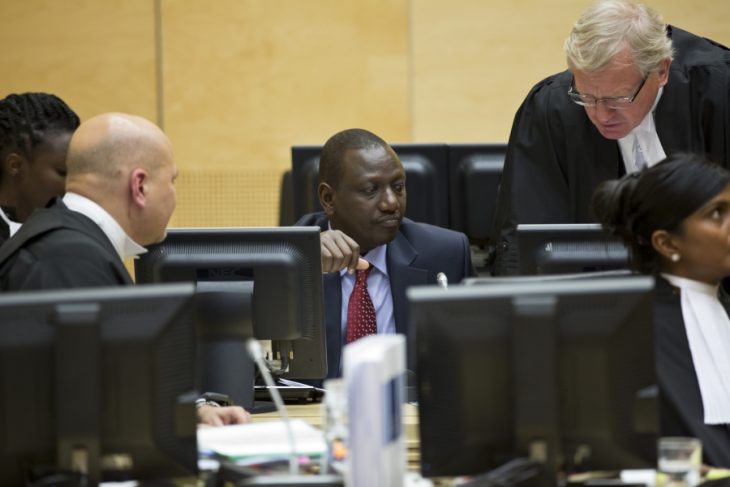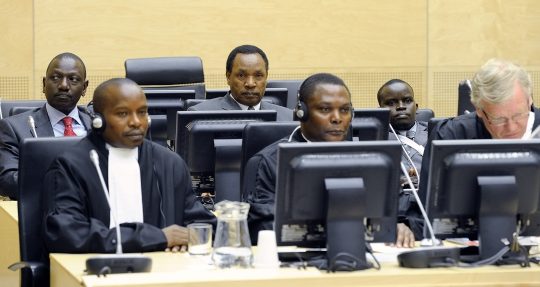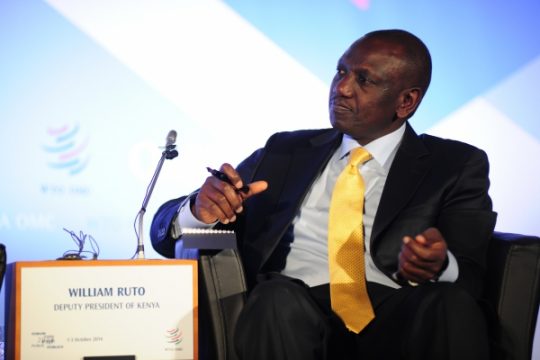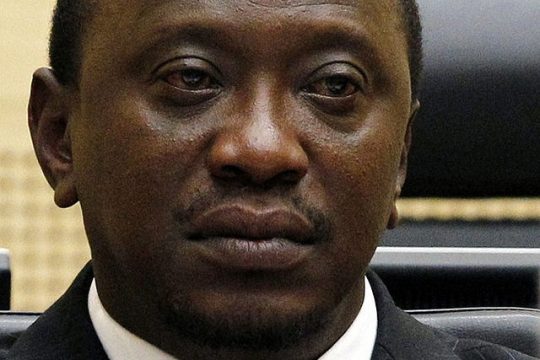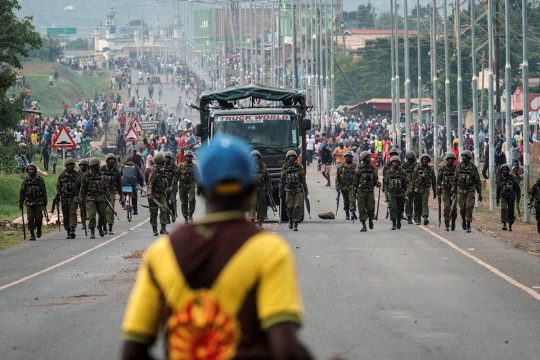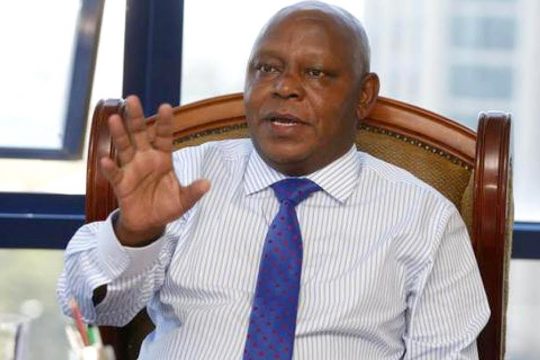For four days of hearings this week in the trial of Kenyan Deputy President William Ruto and journalist Joshua Sang, the new buildings of the International Criminal Court (ICC) have been the scene of the same ballet. A few minutes before the opening, a convoy of Mercedes stopped in front of the Court and the Deputy President emerged. Then, surrounded by his lawyers, bodyguards and MPs come from Nairobi for the occasion, a short, improvised prayer in the hall, as if to motivate the team before the hearings. The two men, charged with crimes against humanity in violence that followed the December 2007 presidential elections, are asking the Court to acquit them. Their lawyers say there is no need to call witnesses in response to those presented by the Prosecution since September 2013 because the case has collapsed. The Prosecutor disagrees.
Player of the Day
If it were a football match, the player of the day would undoubtedly be Canadian-Nigerian presiding judge Chile Eboe-Osuji. The judge has relentlessly delivered blows to all the players in the case, starting with prosecutor Anton Steinberg. Steinberg alleges that Ruto set up a network of dignitaries in the Rift Valley to plan the attacks that followed the 2007 presidential polls. Ruto’s party, the Orange Democratic Party (ODM) supported mostly by Luos and his ethnic group the Kalenjins, had lost the vote to the party of incumbent president Mwai Kibaki. Ruto is said to have paid young people gathered to “expel the Kikuyus”, one of Kenya’s biggest ethnic groups perceived as supporting Kibaki’s Party of National Unity (PNU). Prosecution witnesses said that “euphemisms were used” in these meetings. The tools are alleged to have been firearms, and, according to Steinberg, “firearms are not needed to win elections”. According to the Prosecution, youth militia were ready to target the Kikuyus as soon as the election results were announced. Kalenjins who supported the presidential party were accused of being traitors and forced to pay fines, like one witness who said he had to hand over his livestock to the attackers.
Asking for Evidence
The presiding judge asked constantly for evidence to support these claims and wanted to see them in front of him. “Did Mr. Ruto say himself that they needed to get rid of the Kikuyus?” he asked. “I don’t remember that,” the prosecutor answered, “but there were some very violent words.”
What evidence is there of improvised courts to try the Kalenjins? “Overall, the evidence points to several facts,” said the prosecutor, who preferred to evoke Ruto’s authority over his community. “He is described as a king,” he told the court. Then, when the prosecutor said the Kalenjin king had sent cash to pay the attackers, the presiding judge asked him for evidence that it was a gift of thanks. This seems to be a supposition on the prosecution’s part. Anton Steinberg also spoke of scarification ceremonies organized when the attackers returned. “In African culture, you organize a scarification ceremony to absolve you,” Judge Eboe-Osuji said. “Like in the Catholic Church. You say an Our Father and then you depart as clean as the day was born!” “Yes, there are all kinds of cultural practices,” replied Steinberg, as if to suggest that this time perhaps the judge’s remark was inappropriate.
"Vermin"
On the second day of hearings, it was the turn of lawyers for Joshua Sang, a former presenter for commercial radio Kass FM, to plead acquittal. Joshua Sang was not a member of a network which, said Joseph Kigen-Katwa, had never existed. He said the ICC was not made to judge cases concerning mafia and arms trafficking. If there was no network, the Kenyan lawyer argued, “then the Court has no mandate”. “So for you, it is excluded to look at gangs and mafia?” asked the judge. If there was no network, the crimes were committed in a political context and so they are common law crimes, not crimes against humanity, the lawyer argued in essence.
But the judge came back at him again. The words “vermin” and “weeds” were heard on Kass FM referring to Kikuyus, said Judge Eboe-Osuji. “Even if such words were used, that was freedom of expression, and I don’t think they are criminal,” replied the lawyer, who cited two Western political figures to support his argument. “Look at Donald Trump [a leading contender to be Republican candidate in US elections] calling Latinos rapists and drug traffickers,” he said. “And Geert Wilders [head of a Dutch extreme-Right party] says all kinds of things about Muslims.” Joshua Sang’s words were a lot milder than that, says his lawyer.
It was then lawyer Caroline Buisman who took up the baton. She said that even if there was offensive language, which she contests, that does not mean if was criminal. She said a clear link needed to be proven between the radio programmes broadcast and the alleged crimes. The Judge suggested that the tense situation in Kenya should have led to prudence in the choice of words used by the media.
It was then the turn of Ruto’s defence team. Ruto, after three days in the box, looked tired. But not his lawyer Karim Khan, who attacked the quality of the prosecution’s investigation and claimed the scenario it had put forward was pure fiction, “a good film, in the language of Hollywood”.
The British lawyer, wearing a Masai bracelet on his wrist, reminded the Court that many prosecution witnesses had retracted their original statements and that the key witness had withdrawn. The prosecution says the witnesses were intimidated and bribed, and has issued arrest warrants against people accused of obstructing the course of justice. But the lawyer claimed that the testimonies heard by the Court proved nothing and that the network organigram presented by the Prosecutor at the start of the case had crumbled. If there is no proof that there were meetings to plan the crimes, it is because “the 2007-2008 violence was spontaneous”, he said. Meetings from which Ruto was absent, according to the Defence, whereas the Prosecutor, map in hand, says that he could travel quickly from Nairobi to the Rift Valley. “So now the prosecution is using maps!” said Khan. “They are indeed desperate.” Steinberg replied that the Defence had also “used Google maps whenever they chose”.
A decision is expected in the coming weeks.



